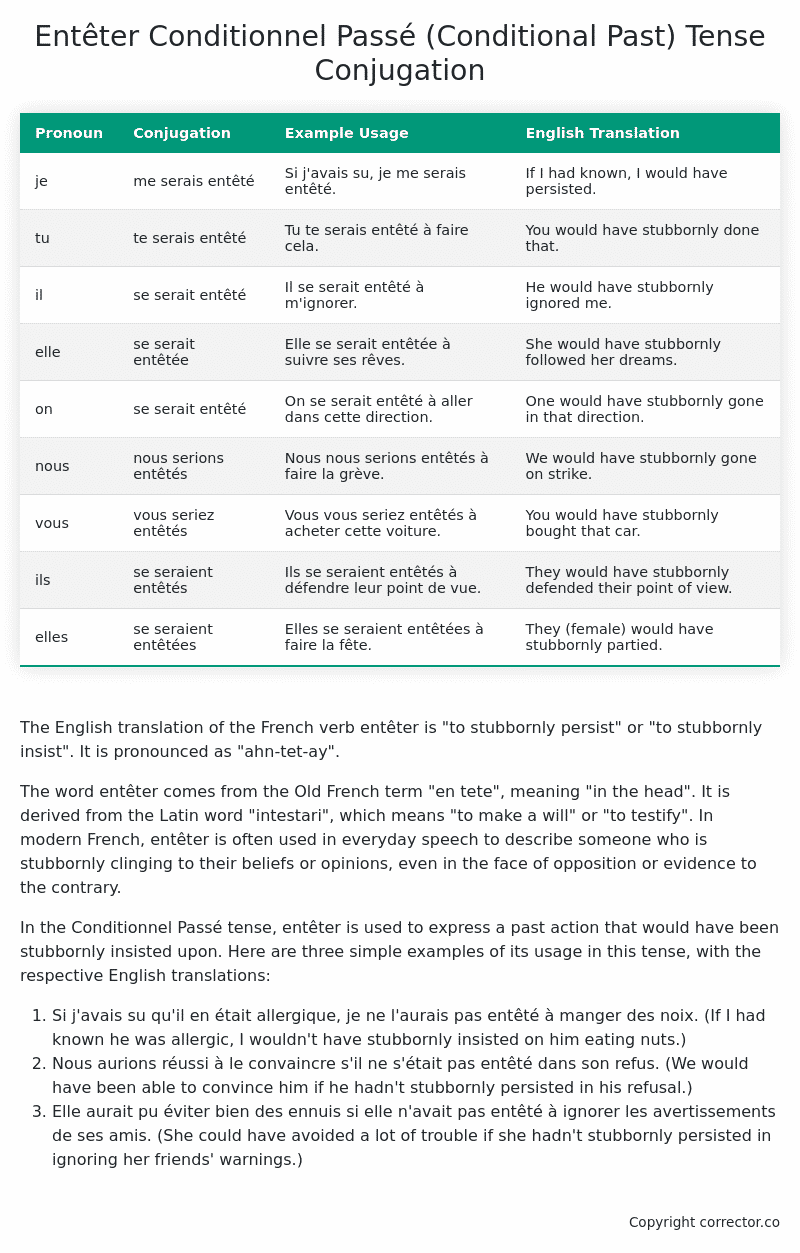Conditionnel Passé (Conditional Past) Tense Conjugation of the French Verb entêter
Introduction to the verb entêter
The English translation of the French verb entêter is “to stubbornly persist” or “to stubbornly insist”. It is pronounced as “ahn-tet-ay”.
The word entêter comes from the Old French term “en tete”, meaning “in the head”. It is derived from the Latin word “intestari”, which means “to make a will” or “to testify”. In modern French, entêter is often used in everyday speech to describe someone who is stubbornly clinging to their beliefs or opinions, even in the face of opposition or evidence to the contrary.
In the Conditionnel Passé tense, entêter is used to express a past action that would have been stubbornly insisted upon. Here are three simple examples of its usage in this tense, with the respective English translations:
- Si j’avais su qu’il en était allergique, je ne l’aurais pas entêté à manger des noix. (If I had known he was allergic, I wouldn’t have stubbornly insisted on him eating nuts.)
- Nous aurions réussi à le convaincre s’il ne s’était pas entêté dans son refus. (We would have been able to convince him if he hadn’t stubbornly persisted in his refusal.)
- Elle aurait pu éviter bien des ennuis si elle n’avait pas entêté à ignorer les avertissements de ses amis. (She could have avoided a lot of trouble if she hadn’t stubbornly persisted in ignoring her friends’ warnings.)
Table of the Conditionnel Passé (Conditional Past) Tense Conjugation of entêter
| Pronoun | Conjugation | Example Usage | English Translation |
|---|---|---|---|
| je | me serais entêté | Si j’avais su, je me serais entêté. | If I had known, I would have persisted. |
| tu | te serais entêté | Tu te serais entêté à faire cela. | You would have stubbornly done that. |
| il | se serait entêté | Il se serait entêté à m’ignorer. | He would have stubbornly ignored me. |
| elle | se serait entêtée | Elle se serait entêtée à suivre ses rêves. | She would have stubbornly followed her dreams. |
| on | se serait entêté | On se serait entêté à aller dans cette direction. | One would have stubbornly gone in that direction. |
| nous | nous serions entêtés | Nous nous serions entêtés à faire la grève. | We would have stubbornly gone on strike. |
| vous | vous seriez entêtés | Vous vous seriez entêtés à acheter cette voiture. | You would have stubbornly bought that car. |
| ils | se seraient entêtés | Ils se seraient entêtés à défendre leur point de vue. | They would have stubbornly defended their point of view. |
| elles | se seraient entêtées | Elles se seraient entêtées à faire la fête. | They (female) would have stubbornly partied. |
Other Conjugations for Entêter.
Le Present (Present Tense) Conjugation of the French Verb entêter
Imparfait (Imperfect) Tense Conjugation of the French Verb entêter
Passé Simple (Simple Past) Tense Conjugation of the French Verb entêter
Passé Composé (Present Perfect) Tense Conjugation of the French Verb entêter
Futur Simple (Simple Future) Tense Conjugation of the French Verb entêter
Futur Proche (Near Future) Tense Conjugation of the French Verb entêter
Plus-que-parfait (Pluperfect) Tense Conjugation of the French Verb entêter
Passé Antérieur (Past Anterior) Tense Conjugation of the French Verb entêter
Futur Antérieur (Future Anterior) Tense Conjugation of the French Verb entêter
Subjonctif Présent (Subjunctive Present) Tense Conjugation of the French Verb entêter
Subjonctif Passé (Subjunctive Past) Tense Conjugation of the French Verb entêter
Subjonctif Imparfait (Subjunctive Imperfect) Tense Conjugation of the French Verb entêter
Subjonctif Plus-que-parfait (Subjunctive Pluperfect) Tense Conjugation of the French Verb entêter
Conditionnel Présent (Conditional Present) Tense Conjugation of the French Verb entêter
Conditionnel Passé (Conditional Past) Tense Conjugation of the French Verb entêter (this article)
L’impératif Présent (Imperative Present) Tense Conjugation of the French Verb entêter
L’infinitif Présent (Infinitive Present) Tense Conjugation of the French Verb entêter
Struggling with French verbs or the language in general? Why not use our free French Grammar Checker – no registration required!
Get a FREE Download Study Sheet of this Conjugation 🔥
Simply right click the image below, click “save image” and get your free reference for the entêter Conditionnel Passé tense conjugation!

Entêter – About the French Conditionnel Passé (Conditional Past) Tense
Formation
Common Everyday Usage Patterns
Expressing Unreal Past Scenarios
Polite Requests or Suggestions
Expressing Doubt or Uncertainty
Interactions with Other Tenses
Conditional Present
Indicative Past Tenses
Conditional Future
Summary
Want More?
I hope you enjoyed this article on the verb entêter. Still in a learning mood? Check out another TOTALLY random French verb conjugation!


